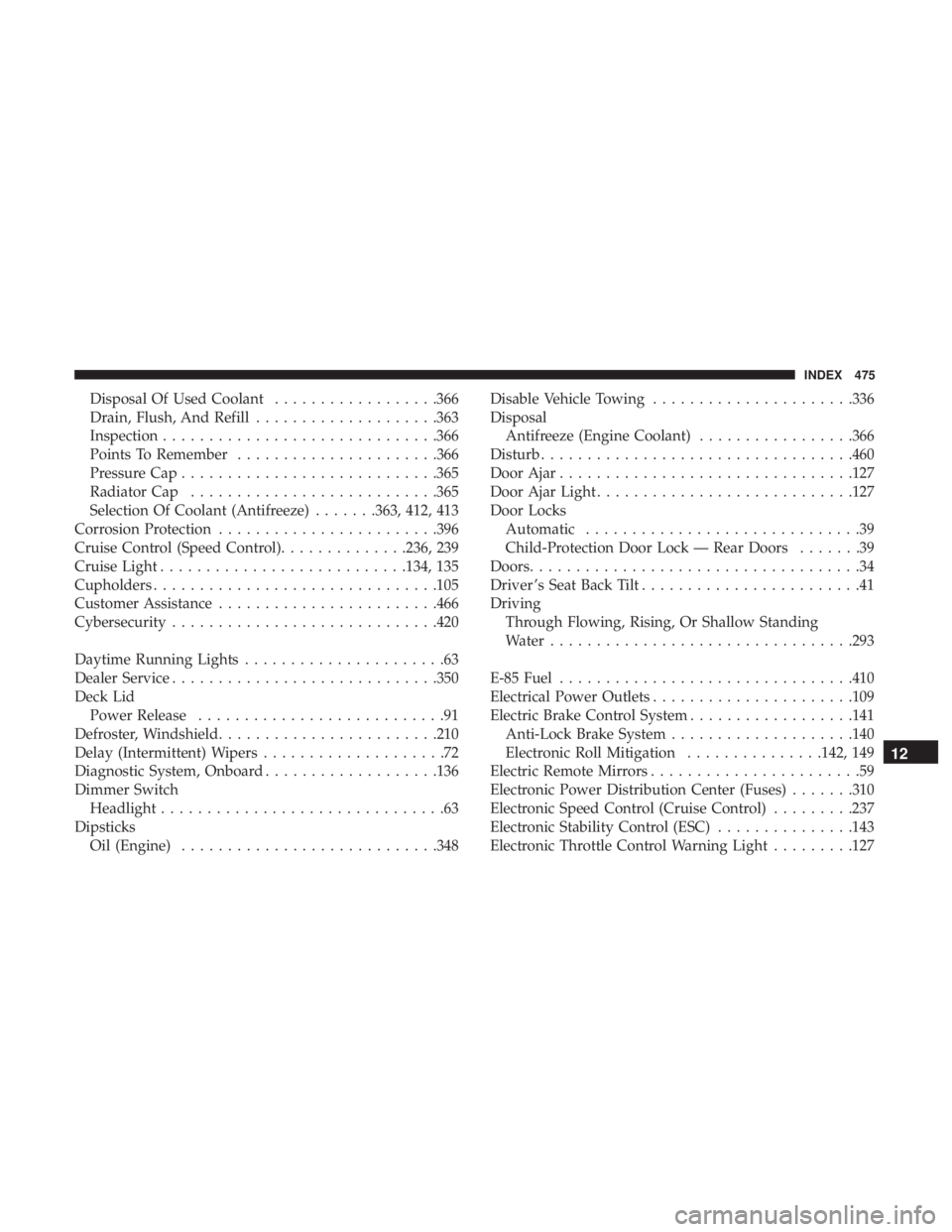Page 216 of 492

▫Activating Adaptive Cruise Control (ACC) .....242
▫ To Activate/Deactivate ...................242
▫ To Set A Desired ACC Speed ...............243
▫ To Cancel ........................... .243
▫ ToTurnOff.......................... .244
▫ To Resume .......................... .244
▫ To Vary The Speed Setting ................244
▫ Setting The Following Distance In ACC .......246
▫ Overtake Aid ......................... .249
▫ ACC Operation At Stop ..................250
▫ Adaptive Cruise Control (ACC) Menu ........250
▫ Display Warnings And Maintenance .........251
▫ Precautions While Driving With ACC .........253
▫ General Information .....................257
▫ Normal (Fixed Speed) Cruise Control Mode . . . .257
� PARKSENSE FRONT AND REAR PARK ASSIST — IF
EQUIPPED ........................... .260▫
ParkSense Sensors ..................... .260
▫ ParkSense Warning Display ................261
▫ ParkSense Display ..................... .261
▫ Enabling And Disabling ParkSense ..........269
▫ Service The ParkSense Park Assist System .....270
▫ Cleaning The ParkSense System .............270
▫ ParkSense System Usage Precautions .........271
� LANESENSE — IF EQUIPPED ..............272
▫ LaneSense Operation ....................272
▫ Turning LaneSense On Or Off ..............273
▫ LaneSense
Warning Message ...............273
▫ Changing LaneSense Status ................276
� PARKVIEW REAR BACK UP CAMERA ........277
� REFUELING THE VEHICLE ................278
▫ Emergency Fuel Filler Door Release ..........280
� VEHICLE LOADING .....................281
▫ Vehicle Certification Label ................281
214 STARTING AND OPERATING
Page 280 of 492

WARNING!
Drivers must be careful when backing up even when
using the ParkView Rear Back Up Camera. Always
check carefully behind your vehicle, and be sure to
check for pedestrians, animals, other vehicles, obstruc-
tions, or blind spots before backing up. You are re-
sponsible for the safety of your surroundings and must
continue to pay attention while backing up. Failure to
do so can result in serious injury or death.
CAUTION!
•To avoid vehicle damage, ParkView should only be
used as a parking aid. The ParkView camera is
unable to view every obstacle or object in your drive
path.
• To avoid vehicle damage, the vehicle must be driven
slowly when using ParkView to be able to stop in
time when an obstacle is seen. It is recommended
that the driver look frequently over his/her shoulder
when using ParkView.
NOTE: If snow, ice, mud, or any foreign substance builds
up on the camera lens, clean the lens, rinse with water, and
dry with a soft cloth. Do not cover the lens.
REFUELING THE VEHICLE
1. Push the fuel filler door release switch (located in the driver’s door map pocket).
2. Open the fuel filler door.
Fuel Filler Door Release Switch
278 STARTING AND OPERATING
Page 281 of 492
NOTE:In certain cold conditions, ice may prevent the fuel
door from opening. If this occurs, lightly push on the fuel
door to break the ice buildup and re-release the fuel door
using the inside release button. Do not pry on the door.
3. There is no fuel filler cap. A flapper door inside the pipe seals the system.
4. Insert the fuel nozzle fully into the filler pipe – the nozzle opens and holds the flapper door while refuel-
ing.
NOTE: Only the correct size nozzle opens the latches
allowing the flapper door to open. 5. Fill the vehicle with fuel – when the fuel nozzle “clicks”
or shuts off the fuel tank is full.
6. Maintain nozzle in filler for 5 seconds to allow nozzle to drain.
7. Remove the fuel nozzle and close the fuel door.
NOTE: A funnel is provided (located in the trunk in the
spare tire area) to open the flapper door to allow for
emergency refueling with a gas can.
Fuel Filler Door
Fuel Funnel
6
STARTING AND OPERATING 279
Page 282 of 492
WARNING!
•Never have any smoking materials lit in or near the
vehicle when the fuel door is open or the tank is
being filled.
• Never add fuel when the engine is running. This is
in violation of most state and federal fire regulations
and may cause the “Malfunction Indicator Light” to
turn on.
• A fire may result if fuel is pumped into a portable
container that is inside of a vehicle. You could be
burned. Always place fuel containers on the ground
while filling.
CAUTION!
To avoid fuel spillage and overfilling, do not “top off”
the fuel tank after filling.
Emergency Fuel Filler Door Release
If you are unable to open the fuel filler door, use the fuel
filler door emergency release located in the trunk.
Follow the steps below to open the fuel door in case of an
emergency:
1. Open the trunk.
2. Remove the access cover (located on the left side inner trim panel).
Access Cover
280 STARTING AND OPERATING
Page 477 of 492

Disposal Of Used Coolant..................366
Drain, Flush, And Refill ....................363
Inspection ............................. .366
Points To Remember ..................... .366
Pressure Cap ........................... .365
Radiator Cap .......................... .365
Selection Of Coolant (Antifreeze) .......363, 412, 413
Corrosion Protection ....................... .396
Cruise Control (Speed Control) ..............236, 239
Cruise Light .......................... .134, 135
Cupholders .............................. .105
Customer Assistance ....................... .466
Cybersecurity ............................ .420
Daytime Running Lights ......................63
Dealer Service ............................ .350
Deck Lid Power Release ...........................91
Defroster, Windshield ....................... .210
Delay (Intermittent) Wipers ....................72
Diagnostic System, Onboard ...................136
Dimmer Switch Headlight ...............................63
Dipsticks Oil (Engine) ........................... .348Disable Vehicle Towing
..................... .336
Disposal Antifreeze (Engine Coolant) .................366
Disturb ................................. .460
Door Ajar ............................... .127
Door Ajar Light ........................... .127
Door Locks Automatic ..............................39
Child-Protection Door Lock — Rear Doors .......39
Doors ....................................34
Driver ’s Seat Back Tilt ........................41
Driving Through Flowing, Rising, Or Shallow Standing
Water ................................ .293
E-85 Fuel ............................... .410
Electrical Power Outlets ..................... .109
Electric Brake Control System ..................141
Anti-Lock Brake System ....................140
Electr
onic Roll Mitigation ...............142, 149
Electric Remote Mirrors .......................59
Electronic Power Distribution Center (Fuses) .......310
Electronic Speed Control (Cruise Control) .........237
Electronic Stability Control (ESC) ...............143
Electronic Throttle Control Warning Light .........127
12
INDEX 475